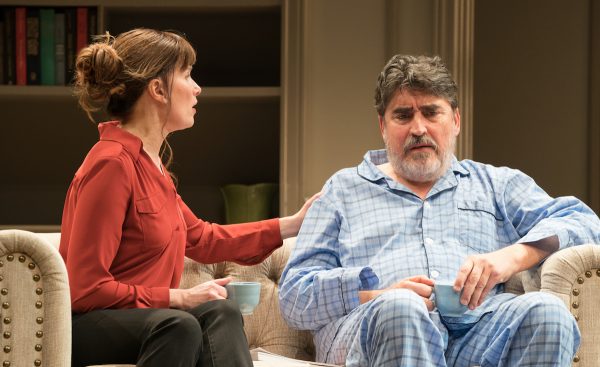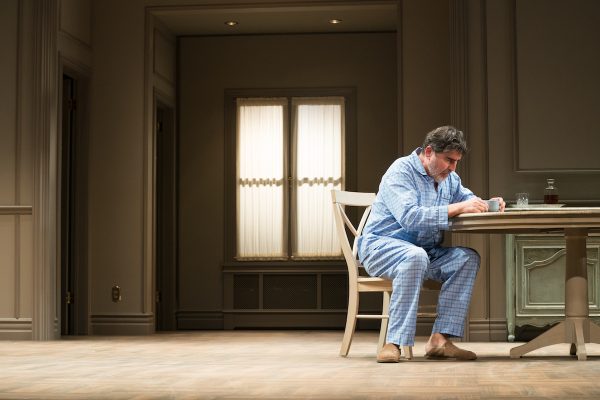Anyone who’s had a close brush with the devastation of a mind that has lost its moorings knows what a profound tragedy that can be. You listen and watch helplessly, unable to do anything to alleviate the fear and anguish that relentlessly take over and that you know will only get worse.
French playwright Florian Zeller’s The Father (not to be confused with the August Strindberg play of the same name) is an attempt to do just that. This Father was a huge hit in Paris (wining the 2014 distinguished Molière Award), London (Olivier nomination) and New York (where it captured a fourth Tony for actor Frank Langella). It is now on view at the Pasadena Playhouse, with the towering Alfred Molina in the title role of André.
André is a widowed former engineer (or former tap-dancer?) showing early signs of dementia. He can’t find his prized watch. He’s sure that a caregiver his daughter Anne (Sue Cremin) hired to help him stole it before he kicked her out. When Anne retrieves the watch from the secret hiding place where André doesn’t recall stashing it, he’s resentful that she proved him wrong. And of course, he’s entirely confident that he can take care of himself and doesn’t need any “helpers.”
When the divorced Anne explains that he will indeed need helpers because she’s met a man and will be moving to London to live with him, André can’t understand why she’d leave Paris or him. He wishes his younger daughter Élise would come instead. He misses Élise, he praises her to the disparagement of Anne, even as we get hints that Élise may no longer be alive. André continues to insist he needs no help, even if he can’t differentiate between Anne’s new man Pierre and her ex-husband, even when, watch or no watch, he can’t quite measure the passage of time, even when the caregivers all begin to look alike…

André is also not a warm and fuzzy person. He’s always sure he knows best. He criticizes the people around him, especially Anne. One begins to suspect he may have been something of a bully in his younger days.
Creating a play about that irreducible descent into hell is no small undertaking. Zeller has structured it as a tricky series of short, staccato scenes, presumably to make us feel the detachment that André is starting to experience. Christopher Hampton’s English translation is fluid enough, but the play’s clinical structure, with its confounding shades of Ionesco and Pinter at their most abstract, has the effect of distancing the man from his audience.
That’s what’s tricky, because it robs this Father of the very thing it needs most: empathy and a soul. What the play turns out to be is a formidable vehicle for any high-caliber actor, for which Molina easily qualifies. You could almost call it a one-man show, because the remaining members of the cast are so thinly sketched in that they serve only one purpose: to escort this man on his free-fall into second childhood.
What holds us in the play’s grip is Molina’s commanding presence, even as his André continues to fail. He may thunder, he may rail, he may question his own mix-ups, he may prefer one caregiver to another until he can no longer tell them apart. Yet when threatened by a man he’s not sure he knows, he backs off like a scared three-year-old. Is the man Anne’s new guy? Her ex-husband? A total stranger? André doesn’t know. And by then, we don’t either. Which is exactly what the playwright wanted.
Every fresh assault on André’s reality, diminishes him a little more. He gets to where he’s not sure if he’s in his own apartment. David Meyers’ elegant set seems to be losing parts of itself; some of the furnishings disappear, books vanish off the shelves. Elizabeth Harper’s lighting seems to be dimming. The challenges to André’s mind multiply until darkness encroaches and the destruction is complete.

Briskly staged by Jessica Kubzansky, this Playhouse production does everything right, but it does not find a way to overcome the play’s contradictions. It has trouble striking a balance between André’s growing isolation and the detachment of the people around him. The choppy nature of the scenes doesn’t help.
The supporting male roles are so bland that even when played by two people — Robert Mammana (as Man) and Michael Manuel (Anne’s lover Pierre) — it’s easy to be as confused by them as is André. Pia Shah (Laura) and Lisa Renée Pitts (Woman) as the caregivers have physical and temperamental differences that make them more distinguishable, but not much. Cremin’s Anne alone is offered the room to display more distress at the hard choices she faces. The words are there, but not the needed emotion.
By definition, lost awareness forces these supporting players to become progressively irrelevant, fading as they do into André’s new reality. It’s a fine line to tread.
Zeller’s existential dilemma aims for more than it achieves. Molina is such a force of nature that André’s final shattering scene, alone in a naked hospital room with an impassive nurse, eludes the impact of his dissolution. We watch, but we don’t always feel it.
Top image: Alfred Molina and Pia Shah in The Father at The Pasadena Playhouse.
Photos by Jenny Graham
WHAT: The Father
WHERE: The Pasadena Playhouse, 39 So. El Molino Ave., Pasadena, CA 91101.
WHEN: Tuesdays-Fridays, 8pm; Saturdays, 2 & 8pm; Sundays, 2 & 7pm. Ends March 1. Open-captioned performance Sunday, Feb. 23, 2pm only.
HOW: Ticket prices start at $25, available by phone at 626.356.7529 or online at pasadenaplayhouse.org.
